
Journal of Comparative Germanic Linguistics
Scope & Guideline
Elevating Understanding of Germanic Language Structures
Introduction
Aims and Scopes
- Comparative Syntax and Morphology:
The journal emphasizes the comparative study of syntax and morphology across Germanic languages, exploring how different languages exhibit unique structural features. - Language Acquisition and Variation:
Research includes investigations into language acquisition processes and dialectal variations, shedding light on how different Germanic languages interact and evolve over time. - Pragmatics and Syntax Interactions:
There is a significant focus on the interplay between pragmatics and syntax, examining how contextual factors influence syntactic structures in various Germanic languages. - Historical Linguistics and Change:
The journal also addresses historical aspects of Germanic languages, including diachronic studies that trace changes in syntax and morphology over time. - Cross-Linguistic Studies:
A core area involves cross-linguistic comparisons, particularly within the Germanic family, to identify universal linguistic patterns and unique divergences.
Trending and Emerging
- Nominal and Verbal Anaphora:
Studies on nominal and verbal anaphora are gaining traction, highlighting the complexities of reference and coherence in discourse across Germanic languages. - Morphosyntactic Innovations:
Research focusing on morphosyntactic phenomena, such as participles and verb movement, is increasingly prominent, showcasing innovative approaches to understanding language structure. - Language Contact and Influence:
Emerging themes include the effects of language contact, particularly in dialects and minority languages, as researchers explore how external influences shape grammatical structures. - Acquisition of Grammatical Structures:
There is a rising interest in the acquisition of grammatical alternates among different languages, particularly how children learn and process complex grammatical systems. - Syntax-Pragmatics Interface:
The interface between syntax and pragmatics is becoming a central theme, with studies exploring how contextual factors influence syntactic choices in various Germanic contexts.
Declining or Waning
- Traditional Historical Linguistics:
There seems to be a waning interest in traditional historical linguistics topics, such as purely diachronic studies without a comparative or theoretical framework. - Less Emphasis on Phonological Studies:
Phonological analyses have become less frequent, indicating a shift towards syntax and semantics, with fewer papers focusing solely on phonetics or phonology. - Reduction of Sociolinguistic Studies:
There is a noticeable decline in sociolinguistic perspectives, which may be attributed to a growing preference for more formal analyses of syntax and morphology.
Similar Journals

Italian Journal of Linguistics
Exploring the intricacies of language and theory.Italian Journal of Linguistics is a prominent academic journal published by PACINI EDITORE, dedicated to advancing the understanding of linguistic theory and application. With its inception in 1996, the journal has fostered scholarly discourse and continues to contribute to the field through rigorous peer-reviewed articles. Operating under the prestigious field of linguistics, the journal currently holds a respectable Q3 quartile ranking as of 2023, showcasing its relevance in the academic community. It also ranks in the top 30% of journals in both Arts and Humanities and Social Sciences disciplines, reflecting its impactful contributions documented in Scopus rankings. While the Italian Journal of Linguistics is not an open-access journal, it offers invaluable insights and innovative research findings, making it an essential resource for researchers, professionals, and students keen on exploring the nuances of language and linguistics. Based in Pisa, Italy, the journal serves as a significant platform for both contemporary studies and classic investigations in linguistics, appealing to an international audience devoted to this ever-evolving field.
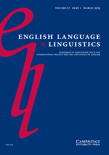
English Language & Linguistics
Illuminating the Pathways of Language UnderstandingEnglish Language & Linguistics is a prestigious journal published by Cambridge University Press, specializing in the dynamic fields of linguistics and language studies. With an impressive Q1 ranking in both Linguistics and Language categories for 2023 and a notable placement in the Scopus metrics, where it ranks #142 out of 1088 in Arts and Humanities, the journal is recognized for its high-quality research contributions and robust impact in the scholarly community. Since its inception in 1997, English Language & Linguistics has provided a forum for researchers to explore various aspects of language, facilitating the dissemination of innovative ideas and empirical studies. With no open access options currently available, the journal remains a valuable resource within the United Kingdom and beyond, fostering a deeper understanding of language intricacies and their broader societal implications. For practitioners and academicians alike, this journal is a critical resource for keeping abreast of the latest advancements in linguistics.
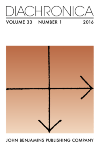
Diachronica
Exploring the Evolution of Language and ThoughtDiachronica is a prestigious academic journal published by John Benjamins Publishing Co that specializes in the fields of Linguistics and Philosophy. Established in 1984, it has become a significant platform for researchers and scholars to disseminate their work on language change and diachronic linguistics, offering insights into the evolution of languages over time. With an impressive impact factor and recognized rankings within the Q2 category for both Linguistics and Language as well as Philosophy in 2023, Diachronica offers a valuable resource for academics interested in the interplay between historical linguistics and philosophical discourse. Although the journal is not open access, it ensures that its articles are rigorously peer-reviewed and of high academic quality. For researchers, professionals, and students looking to deepen their understanding of language dynamics, Diachronica stands out as an essential component of the scholarly dialogue surrounding linguistic change.
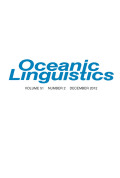
OCEANIC LINGUISTICS
Showcasing the Voices of the PacificOCEANIC LINGUISTICS is a premier academic journal published by UNIV HAWAII PRESS, dedicated to the study of languages spoken in the Pacific region. This esteemed journal, bearing ISSN 0029-8115 and E-ISSN 1527-9421, serves as a vital platform for linguists, researchers, and scholars to disseminate significant findings and insights related to Oceania's rich linguistic diversity. With a commendable impact factor and categorized in the Q2 Quartile for the field of linguistics and language, OCEANIC LINGUISTICS ranks 335th out of 1088 in Arts and Humanities and 395th out of 1167 in Social Sciences, reflecting its relevance and influence in ongoing linguistic discourse. The journal is a subscription-based publication, committed to advancing research and fostering scholarly communication from 2004 to 2024, making it an essential resource for anyone engaged in the study of linguistic phenomena in the Oceania region and beyond.

JOURNAL OF EAST ASIAN LINGUISTICS
Illuminating the Linguistic Landscape of East AsiaJOURNAL OF EAST ASIAN LINGUISTICS, published by SPRINGER, is a premier academic journal that focuses on the rich and diverse linguistic phenomena from East Asia. With an ISSN of 0925-8558 and an E-ISSN of 1572-8560, this journal has steadily contributed to the fields of linguistics and the history and philosophy of science since its inception in 1992. Operating from its base in the Netherlands, the journal is recognized for its impactful research, holding a Q2 category ranking in both the History and Philosophy of Science and Linguistics and Language. It boasts an impressive standing in Scopus rankings, highlighting its relevance and contribution to the academic community with a 66th percentile ranking in Language and Linguistics. The journal is not currently open access, ensuring a rigorous peer-review process that elevates the quality of published articles. By bridging theory and empirical research, the JOURNAL OF EAST ASIAN LINGUISTICS plays a vital role in advancing knowledge in linguistics, making it an essential resource for researchers, professionals, and students interested in East Asian languages and their complexities.

Voprosy Yazykoznaniya
Innovating Perspectives in Language and SocietyVoprosy Yazykoznaniya, published by the esteemed Russian Academy of Sciences and the State Academy of Humanities (GAUGN), stands as a leading journal in the field of linguistics and language studies. With an impressive Q2 rank in Linguistics and Language for 2023 and a strong position within Scopus rankings, this journal fosters scholarly dialogue and pushes the boundaries of linguistic research by providing a platform for innovative studies, reviews, and analyses. Although not open access, its publication ensures high academic standards and visibility within the global academic community. Researchers, professionals, and students alike can benefit from the rich insights and diverse perspectives presented in this journal, serving as a vital resource for anyone interested in the intricacies of language and its role in society. Operating since 2009 and continuing to 2024, Voprosy Yazykoznaniya is an essential reference point for contemporary linguistic scholarship in the Russian Federation and beyond.
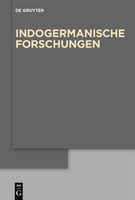
INDOGERMANISCHE FORSCHUNGEN
Advancing Scholarship in Historical Language StudiesINDOGERMANISCHE FORSCHUNGEN is a prominent academic journal, published by WALTER DE GRUYTER GMBH, focused on the field of linguistics and language studies. With an impressive history that dates back to 1892, this journal has been a vital resource for researchers and professionals exploring the intricacies of Indo-European languages. Although it does not offer open access, its comprehensive and rigorous articles—published in both print (ISSN: 0019-7262) and electronic formats (E-ISSN: 1613-0405)—are instrumental for anyone delving into historical linguistics and comparative studies. The journal currently holds a Q3 ranking in Linguistics and Language, indicating its significance within the academic community, as evidenced by its Scopus rankings in both the Arts and Humanities and Social Sciences domains. Spanning decades of scholarship, INDOGERMANISCHE FORSCHUNGEN plays a pivotal role in advancing the study of language and is essential for scholars aiming to contribute to the dialogue in this ever-evolving discipline.

Journal of Portuguese Linguistics
Unlocking the Richness of Portuguese Language StudiesThe Journal of Portuguese Linguistics is an esteemed peer-reviewed academic journal published by UBIQUITY PRESS LTD, dedicated to the exploration of the rich complexities of the Portuguese language and its various linguistic dimensions. With an ISSN of 1645-4537 and an E-ISSN of 2397-5563, this open-access journal has been disseminating valuable research since 2002, ensuring that knowledge is accessible to all scholars, professionals, and students interested in Linguistics. Based in Portugal, it features a distinct focus on the linguistics pertinent to the Portuguese language, facilitating discussions that span theoretical and applied interests. The journal holds a respectable Q3 quartile rank in the field of Linguistics and Language, reflecting its growing significance and contribution to academia, as evidenced by Scopus rankings that place it in the 71st and 68th percentiles in Arts and Humanities as well as Social Sciences. Researchers and practitioners alike will find Journal of Portuguese Linguistics to be an indispensable resource for fostering discourse and innovation in the study of language.

Lingue e Linguaggio
Illuminating the Intersections of Language and SocietyLingue e Linguaggio, published by SOC ED IL MULINO, is a distinguished academic journal in the field of Linguistics and Language, hailing from Bologna, Italy. With an esteemed Q2 ranking in its category as of 2023, this journal is recognized for its contributions to both the arts and humanities as well as social sciences, achieving notable positions within Scopus rankings. It serves as a vital platform for researchers, practitioners, and students interested in exploring various linguistic phenomena, language dynamics, and theoretical frameworks. Although it operates under a traditional subscription model rather than open access, its comprehensive array of studies and publications provides significant insights and fosters academic discourse. With a publication period extending from 2002 to 2024, Lingue e Linguaggio continues to be a key resource for advancing the understanding of language in contemporary contexts.
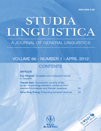
STUDIA LINGUISTICA
Advancing Knowledge in Linguistics and LanguageSTUDIA LINGUISTICA is a prestigious journal published by Wiley, focusing on the dynamic and multifaceted fields of Linguistics and Language. With an ISSN of 0039-3193 and an E-ISSN of 1467-9582, the journal has been a vital resource for academics since its inception in 1947, diligently converging insights from history and philosophy of science alongside contemporary linguistic research. Demonstrating excellent scholarly impact, STUDIA LINGUISTICA proudly holds a Q1 ranking in Linguistics and Language as well as a Q2 in History and Philosophy of Science as of 2023, indicating its significance within these academic domains. Furthermore, it ranks in the top percentiles among similar journals, with a commendable 73rd percentile in Language and Linguistics and 70th in related social sciences. Although it does not offer Open Access, its contribution to the discourse of language studies is underpinned by rigorous peer-review processes and commitment to advancing theoretical and empirical research. For researchers, professionals, and students alike, STUDIA LINGUISTICA remains an essential platform for disseminating impactful linguistic scholarship worldwide.